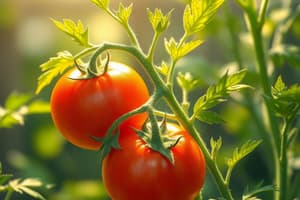Podcast
Questions and Answers
What is the primary function of roots in plants?
What is the primary function of roots in plants?
- Fixing the plant in the soil (correct)
- Photosynthesis
- Absorbing sunlight
- Producing glucose
During which process do plants produce their own food?
During which process do plants produce their own food?
- Photosynthesis (correct)
- Germination
- Respiration
- Transpiration
What is the outcome of sunlight combined with carbon dioxide and water during photosynthesis?
What is the outcome of sunlight combined with carbon dioxide and water during photosynthesis?
- Water and starch
- Glucose and carbon monoxide
- Nitrogen and oxygen
- Oxygen and glucose (correct)
What is the effect of light on plant height when comparing plants in sunlight versus plants in darkness?
What is the effect of light on plant height when comparing plants in sunlight versus plants in darkness?
Which part of the plant is primarily responsible for absorbing water and nutrients?
Which part of the plant is primarily responsible for absorbing water and nutrients?
Which of these statements about the plant growth stages is true?
Which of these statements about the plant growth stages is true?
What type of sugar do plants produce as food during photosynthesis?
What type of sugar do plants produce as food during photosynthesis?
What is the primary function of xylem in plants?
What is the primary function of xylem in plants?
Which type of stem is characterized by its ability to grow underground?
Which type of stem is characterized by its ability to grow underground?
What role does chlorophyll play in leaves?
What role does chlorophyll play in leaves?
What do stomata primarily facilitate in leaves?
What do stomata primarily facilitate in leaves?
What process allows plants to produce glucose and oxygen using sunlight?
What process allows plants to produce glucose and oxygen using sunlight?
How do plants and humans mainly acquire energy?
How do plants and humans mainly acquire energy?
Which statement about the transport of nutrients in plants is accurate?
Which statement about the transport of nutrients in plants is accurate?
What happens when a plant is placed in colored water, according to the content?
What happens when a plant is placed in colored water, according to the content?
Which type of blood vessel carries blood rich in oxygen from the heart to body cells?
Which type of blood vessel carries blood rich in oxygen from the heart to body cells?
What is the primary function of the heart in the human circulatory system?
What is the primary function of the heart in the human circulatory system?
What is the role of phloem in the plant transport system?
What is the role of phloem in the plant transport system?
What characteristic do both the human circulatory system and the plant transport system share?
What characteristic do both the human circulatory system and the plant transport system share?
What do seeds require to grow into a new plant?
What do seeds require to grow into a new plant?
How does seed dispersal occur in nature?
How does seed dispersal occur in nature?
What type of blood do veins carry back to the heart?
What type of blood do veins carry back to the heart?
What are the two upper chambers of the heart called?
What are the two upper chambers of the heart called?
Flashcards are hidden until you start studying
Study Notes
Plant Needs
- Essential for plant growth: water, air (carbon dioxide), sunlight, and nutrients from soil.
- Plants progress through growth stages: seed, seedling, mature tree.
- All organisms require food for energy and nutrients; plants produce food via photosynthesis.
Photosynthesis
- A process that allows plants to manufacture food (glucose) using sunlight, carbon dioxide, and water.
- Equation: Sunlight + Carbon Dioxide + Water → Sugar + Oxygen.
- Plant leaves collect sunlight and carbon dioxide; roots absorb water.
Impact of Light on Growth
- Plants exposed to light grow taller, develop more leaves, and have darker green coloration.
- Plants lacking light become shorter, have fewer leaves, and exhibit pale coloration.
Plant Structure
-
Three main parts: roots, stems, leaves.
-
Roots:
- Contain root hairs, enhancing water and nutrient absorption.
- Functions: anchoring the plant and facilitating nutrient uptake.
-
Stems:
- Contain xylem, which transports water and nutrients from roots to leaves.
- Forms include wood stems, upright stems, climbing stems, tubers, and runners.
-
Leaves:
- Known as the food factory; green due to chlorophyll, which captures sunlight.
- Stomata are small pores on leaves for gas exchange.
Transport Systems
- Xylem: transports water and nutrients upward from roots.
- Phloem: transports sugars produced in leaves downward to other plant parts.
- Vascular system in plants functions similarly to the human circulatory system, transporting vital materials.
Photosynthesis Process
- Roots absorb water and minerals, sending them to the stem and leaves.
- Chlorophyll absorbs sunlight to create glucose and oxygen during photosynthesis.
Plant and Human Systems Comparison
- Both plants and humans require water and air to survive.
- Plants generate energy from glucose via photosynthesis; humans require digestible food.
- Human circulatory system consists of the heart and blood vessels that transport oxygen and nutrients.
Flowering and Reproduction
- Flowers serve as reproductive organs; they vary greatly in shape, size, and color.
- Their primary function is seed production, vital for plant reproduction.
Seed Dispersal
- Seeds undergo dispersal to new locations by various methods:
- Floating on water, wind transportation, attaching to animals or humans, and being consumed and excreted by animals.
Studying That Suits You
Use AI to generate personalized quizzes and flashcards to suit your learning preferences.



